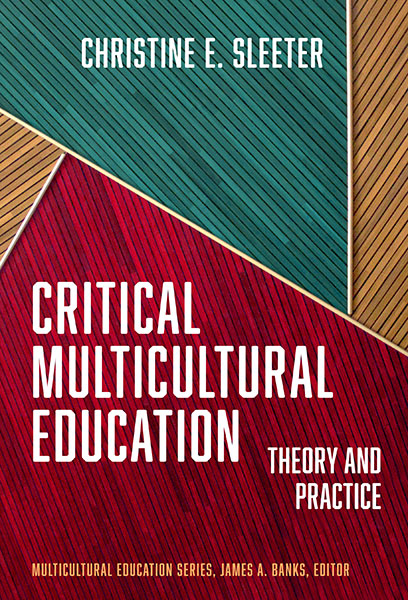Professors: Request an Exam Copy
Print copies available for US orders only. For orders outside the US, see our international distributors.
Publication Date: July 26, 2024
Pages: 192
Series: Multicultural Education Series

“Sleeter effortlessly weaves together analyses of personal narratives, anecdotes, history, case studies, and political events and social movements to argue for a reanimated critical multicultural education theory and practice; and in doing so, Sleeter shows just how deep the roots of the multicultural education tree lie.” —Teachers College Record
This volume collects Christine Sleeter’s core work focusing on critical multicultural education, situating culture and identity within an analysis of power and racism.
Multicultural education arose in the context of the Civil Rights Movement and, in its inception, shared with that movement a focus on eradicating both interpersonal and systemic racism. The problem this book takes up is that, over time, many people have come to understand and enact multicultural education in ways that evade grappling directly with racism. This dilution has happened for several reasons, including White teachers’ rearticulations of multicultural education as “getting along” or learning to be colorblind and neoliberal reforms that have reduced it to a celebration of cultural diversity while maintaining silence about racism.
Critical Multicultural Education includes ten of Sleeter’s articles that explicitly locate multicultural education within critical understandings of race, racism, and colonialism, offering both theoretical and practical discussions of what that means.
Book Features:
Christine E. Sleeter is professor emerita in the College of Education at California State University, Monterey Bay. Her books include Critical Race Theory and Its Critics, Transformative Ethnic Studies in Schools, and Un-Standardizing Curriculum.
“Sleeter effortlessly weaves together analyses of personal narratives, anecdotes, history, case studies, and political events and social movements to argue for a reanimated critical multicultural education theory and practice; and in doing so, Sleeter shows just how deep the roots of the multicultural education tree lie.”
—Teachers College Record
“A book for practitioners, researchers, theorists, and policymakers across disciplines, time, place, space, race, and worldview, Sleeter has produced a deeply researched, contextualized, and nuanced account of multicultural education.”
—H. Richard Milner IV, Cornelius Vanderbilt Professor of Education, Vanderbilt University, author of The Race Card
“Christine Sleeter has been a brilliant and courageous thought leader in critical multicultural education (CME) for over two decades, breaking with white solidarity long before it was acceptable in mainstream discourse. I consider her a foundational mentor whose work has had a profound influence on how I understand and articulate the dynamics of systemic racism and the role of white people in achieving racial justice. This beautiful and intersectional volume traces the trajectory of CME from its inception to the present time, delineating the resistance it has faced and speaking back to current forms of backlash with clarity and nuance. Critical Multicultural Education needs to be required reading in every school of education.”
—Robin DiAngelo, author of Is Everyone Really Equal?, White Fragility, and Nice Racism
“As conservatives across the country launch all-out attacks against any form of diversity in schools, Christine Sleeter’s Critical Multicultural Education: Theory and Practice is an important intervention on the side of racial justice in education.”
—Wayne Au, editor, Rethinking Schools, and professor, UW Bothell School of Educational Studies
Contents
Series Foreword James A. Banks ix
Introduction 1
Pivot Points in My Biographical Journey 1
Why Critical? 5
Part I: Defining Critical Multicultural Education
1. Critical Multiculturalism: An Introduction 13
With Stephen May
The Limits of Liberal Multiculturalism 15
Critical Responses to Multiculturalism 19
Critical Multiculturalism 22
2. Critical Pedagogy, Critical Race Theory, and Antiracist Education: Implications for Multicultural Education 25
With Dolores Delgado Bernal
Critical Pedagogy and Multicultural Education 27
Critical Race Theory and Multicultural Education 33
AntiRacist Education 41
Discussion 46
3. Capitalism and Caste 50
Roots of Caste and Capitalism 50
Racial Capitalism 52
Marxism as a Western European Totalizing Theory 53
School Reform, Curriculum, and Public Consciousness 55
Conclusion 57
Part II: Critical Multicultural Education and School Reform
4. Challenging Racism and Colonialism Through Ethnic Studies 61
Minoritized Youth and Historical Amnesia 62
What Happened to Multicultural Education? 63
Curriculum: Still Through White Points of View 65
Ethnic Studies as a Decolonial Project 67
Ethnic Studies Praxis 70
Implications 73
5. Critical Race Theory as the New Villain 75
With Francesca A. López
The Bastardization of Critical Race Theory 75
Efforts to Make Curriculum More Inclusive 77
Reactions to Equitable Education Endeavors 79
What the Critics Are Saying 81
How We Respond to the Critics 83
CRT as the Villain 85
Conclusion 89
6. Diversity, Social Justice, and Resistance to Disempowerment 90
Diversity, Social Justice, and School Reform Under Neoliberalism 91
Curriculum That Disempowers 93
Curriculum That Empowers 95
Confronting the Education Reform Paradigm 97
7. Equity and Race-Visible Urban School Reform 98
The Problem With Color-Blind Solutions to Urban School Challenges 99
Race-Visible Pedagogy in the Classroom 101
Race-Visible Teachers 105
Race and Class Visible Equity in Access 107
Conclusion 109
8. Teaching for Social Justice in Multicultural Classrooms 111
Four Hallmarks of Teaching for Social Justice in Multicultural Classrooms 111
Framework for Designing Classroom Teaching 114
Conclusion 120
Part III: Personalizing Critical Multicultural Education
9. Situating Oneself in a Critical Multicultural History 123
Family History as an Entrée into History 124
Benefiting From Colonization 125
Implications 127
10. Multicultural Curriculum and Critical Family History 129
Approaches to Family History Research 129
Theoretical Lenses for Critical Family History 130
Tools for Researching Critical Family History 133
Teaching Multicultural Curriculum With Critical Family History 136
Conclusion 139
References 141
Index 167
About the Author 178
Professors: Request an Exam Copy
Print copies available for US orders only. For orders outside the US, see our international distributors.